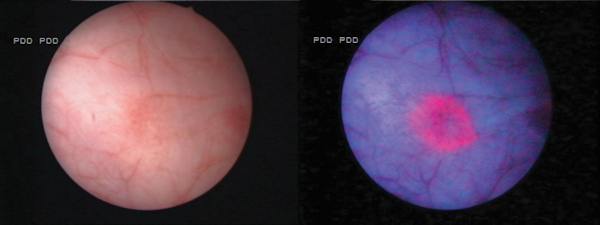When it comes to fighting cancer, early and accurate diagnoses are helping people live longer than ever by detecting cancer at its earliest, when treatment is most effective.
Now, a new technology at Tanner Health System is helping urinary medicine specialists find instances of bladder cancer earlier by offering clearer, more detailed images of the inside of patients’ bladders.
Recent advancements in bladder cancer screenings — such as a cystoscopy — are proving effective in helping physicians to find bladder cancer and stop it in its tracks. During a cystoscopy, a very thin instrument tipped with a tiny camera is passed through the urethra to see inside the bladder.
Bladder cancer is among the most common forms of cancer diagnosed in the United States. The American Cancer Society estimates that more than 17,000 women and more than 34,000 men will be diagnosed nationwide this year, making screenings and accurate diagnoses critical in bladder cancer care.
Bladder cancer is found in men more often than it is in women, and nearly half of all cases are diagnosed as non-muscle invasive bladder cancer, which is cancer that’s found on the inner lining of the bladder. If left untreated, non-muscle invasive bladder cancer can spread into the walls of the bladder muscle, increasing the risk of the cancer spreading throughout the bladder.
Symptoms of bladder cancer can include pain with urination, frequent urination, blood in the urine and pain in the back or pelvis. Those most likely to develop bladder cancer include people who have a history of tobacco use, with past radiation exposure, who are age 55 or older, and who have with a family history of bladder or other urothelial cancers. People who have had chronic or recurrent urinary infections are also at greater risk of developing bladder cancer.
 With a new approach to bladder cancer care available now at Tanner, physicians can detect non-muscle invasive bladder cancer with greater accuracy through a diagnostic screening called Blue Light Cystoscopy with Cysview®, which makes the cancer “glow” bright pink under blue light.
With a new approach to bladder cancer care available now at Tanner, physicians can detect non-muscle invasive bladder cancer with greater accuracy through a diagnostic screening called Blue Light Cystoscopy with Cysview®, which makes the cancer “glow” bright pink under blue light.
The technology sounds simple enough — by changing out the standard light used for a cystoscopy for a blue light, urologists are able to see cancer on the interior of the bladder more clearly. This enables them to find cancer when it’s still very small, in its earliest stages, as well as to see how far it’s advanced — both factors that are critical to effective treatment planning.
“The blue light cystoscopy is leading-edge technology that significantly improves the detection of non-muscle invasive bladder cancer compared to standard white light cystoscopies alone,” said Kevin McLaughlin, MD, a board-certified urology specialist with West Georgia Urology and a member of the medical staff at Tanner. “It provides the earliest diagnosis and allows us to develop the most effective plan of care to provide the best outcome for our patients. Having this approach available keeps with our promise to deliver comprehensive cancer care.”
Tanner is the only provider in the region offering this innovative approach to bladder care.
With locations in Carrollton, Bremen, Villa Rica and Wedowee, Tanner Urology Care offers advanced treatment for a variety of urologic conditions.
To learn more about blue light cystoscopy and the urology care services available at Tanner, visit tanner.org/bluelight. To make an appointment with a urology specialist at Tanner, call 678-661-2664.